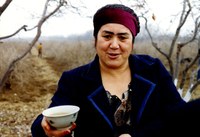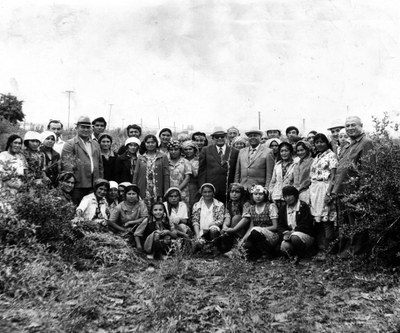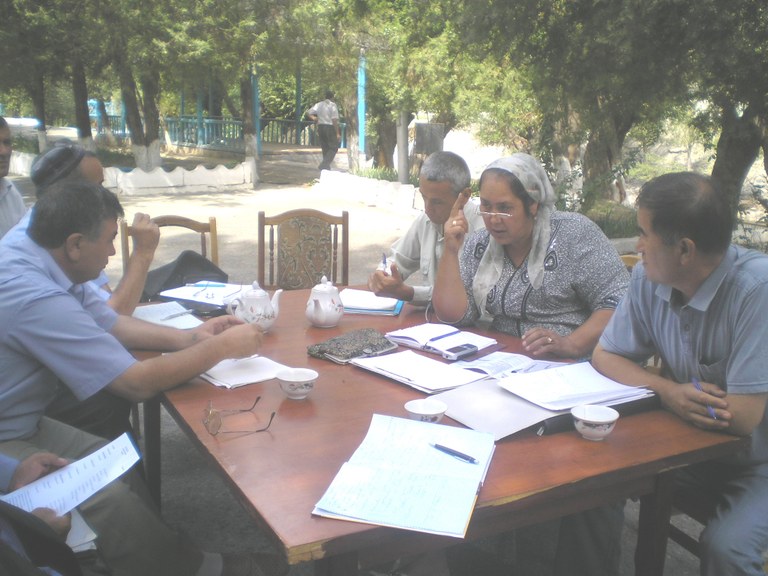Kyrk-Kyz or forty girls in Uzbekistan gain the courage for leadership
The Central Asian region is the home to five countries located in the Syrdarya and the Amudarya river basins – Kazakhstan, Kyrgyzstan, Tajikistan, Turkmenistan, and Uzbekistan. In rural areas, where 63% of population live, livelihood is connected with irrigated agriculture, which uses more than 85% of all water resources. The wellbeing of rural people depends on water supply, equitable water allocation, and wise gender-based water management.
Agrarian reforms introduced over recent years have resulted in the establishment of hundreds of thousands of private farms instead of collective farms. This has required changes in water resource management practice, including transparency of information and public awareness and participation. The private farms had to unite and establish water user associations (WUA). The South Fergana Canal in Fergana valley supplies water to more than two thousand farmers who grow mainly cotton and wheat on 85,000 hectares of land. It is no easy task to distribute water equitably among so many water users, and a woman, Mastura Saifutdinova, has been elected as a chairperson of the WUA’s council.
Chairperson of the Canal Water Committee
Mastura is also chairperson of the Canal Water Committee, established to involve a public organisation in the water management process. It combines the governmental canal management organisation and the public WUA, and defends rights and interests of all stakeholders. Mastura has found money for construction of water supply pipelines for two large villages where people had to collect water from ditches. Her leading position assists in wider involvement of women in the WUA.
When asked why she thinks she is elected she answers: “…presumably, due to my working experience in agriculture and water management, and experience in leadership”.
In a new state farm established in 1980 in Fergana valley to grow pomegranates, forty girls created a brigade and called it “Kyrk-Kyz”. They were very young then, and worked together for many years. Mastura brought them all together and was a leader of this brigade. Now there are 600 farmers in her WUA, and 40 of them are women. Nowadays, in this difficult time her Kyrk-Kyz has assumed responsibilities for private farm management.
Women resolve water conflicts
2008 was a dry year, and already by the beginning of summer water deficiencies were apparent. Conflict was expected and, as a rule, even if the farm manager is a man, his wife resolves water conflicts. Very often during irrigation it is necessary to sit and watch at the water outlet day and night. Some disputes even descend into hand-to-hand fighting for water. To avoid the use of force to settle disputes, women go to the water outlet instead of their husbands and sons to watch over the water distribution.
Rural women, as housekeepers, were charged with the survival of the family under conditions of increasingly uncertain social security and male unemployment following the disintegration of the Soviet Union. While men accommodated themselves with difficulty and often migrated, women have since learned to deal with unfamiliar issues that were once a male prerogative.
During Soviet times women carried out all fieldwork in the collective farms. Over many years they have learned to cultivate land and to irrigate crops. Based on that experience today’s women fearlessly assume the responsibility for farm management. They irrigate, participate in water allocation, and find machinery for land tillage, etc., all because current circumstances force them to do so.
Not afraid of “top officials”
One key factor in Mastura’s success, is that she is not afraid of “top officials”. Women at local level generally have less fear than men when it comes to negotiating with local municipal authorities, and so manage to overcome barriers.
The establishment of private farms is associated with various problems. Very often rural men without knowing legislation lose courage and give up. “Strangely enough”, says Mr. Shukharat Mukhamedjanov, one of the leaders of an IWRM project in Fergana valley, “ a woman acts differently in such situations. If she feels that she doesn’t know something, she seeks an explanation and to be shown the relevant law. If it is impossible to resolve her problems and needs locally, she is not afraid, like men often are, to go and resolve them at a higher level of authority.”

Mastura chairing a field meeting of the canal Water Committee discussing the organisation of water delivery, required amounts of irrigation water and the organisation of canal cleaning
Only women gave answers to questions
He gives another example. “Within the framework of the IWRM-Fergana project, a seminar has been conducted for farmers in the Kuva rayon. More than 150 farmers participated including 15 woman farmers. Only women gave answers to questions raised and only women had keen interest in all problems associated with agricultural production and water allocation and ways for their solution. Strangely enough, Men didn’t show such initiative, not because they know everything or don’t have problems. More likely they felt subdued by the presence of the rayon (district) authorities… Men were reluctant to express themselves, but women freely expressed their opinion and criticised the rayon leaders present. Only the women forced the careless leaders to think about resolving farmers’ problems.”
Maybe it is true indeed that the solution of problems of a wider group of people can be dealt with by women. After all, it is not acceptable for a man to lift his hand against a woman, or for a woman to be shouted at or thrown out, while women who have worked so hard and come so far are not easily bribed.
All this confirms that Mastura has turned out to be the leader of not only her farm, but the manager of the Water User Association without special education in water management. Today as the chairperson of the big Canal Water Users Committee she advocates with fortitude the equitable distribution of water.


